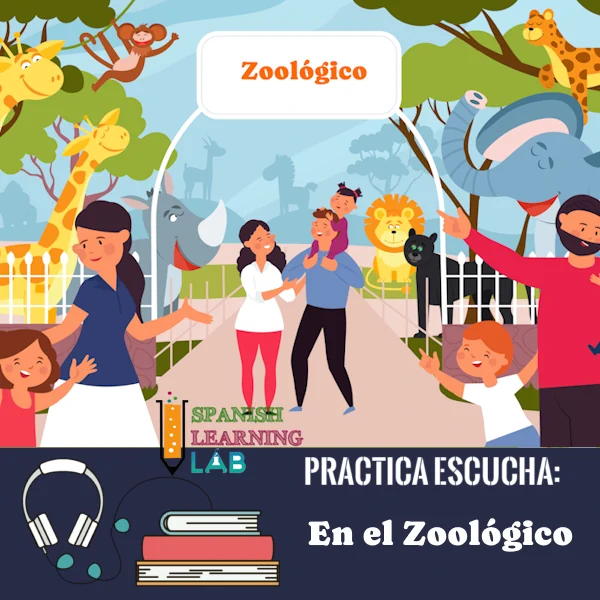¡Hola! ¡Bienvenido! In this lesson, we will learn a short list of zoo animals in Spanish through a nice video and examples with this vocabulary. Also, we will be introducing some verbs that are often tied to specific activities that animals perform. The focus of this lesson will be a listening activity about a visit to the zoo in Spanish. Let’s start…

Vocabulary introduction: A list of Zoo Animals in Spanish
In order to begin this the right way, we will ask you to first check a video introducing a list of zoo animals in Spanish. This video covers ten animals we may find at a zoo. Pay attention to the pronunciation of these words and how they are used in simple sentences.
Common words and phrases to talk about zoo animals in Spanish
Before moving on to the main listening activity, we will first learn a few common words and phrases that people often talk about zoo animals in Spanish and pets as well. Listen to the pronunciation of the different animals in the list and the related vocabulary. Some of these examples will be the basis for the main listening activity in this lesson.
|
Los leones son animales muy feroces.
Lions are very ferocious animals.
|
|
Hay pocos osos en el polo norte.
There are few bears in the north pole.
|
|
El águila está volando sobre el valle. Ya capturó a su presa.
The eagle is flying over the valley. It has already captured his prey.
|
|
Los pingüinos son aves muy interesantes. Pueden nadar a gran velocidad.
Penguins are very interesting birds. They can swim at a great speed.
|
|
Los elefantes son muy gentiles. Tienen las orejas muy grandes.
Elephants are very gentle. They have very large ears.
|
|
Los pavos reales machos usan sus plumas vistosas para atraer a las hembras.
Male peacocks use their showy feathers to attract females.
|
|
El tigre está persiguiendo al jabalí.
The tiger is chasing the boar.
|
|
Los monos están saltando de rama en rama.
The monkeys are jumping from branch to branch.
|
|
Los hipopótamos son muy peligrosos.
Hippos are very dangerous.
|
|
El perezoso duerme casi todo el día.
The sloth sleeps most of the day.
|
|
Los delfines son muy inteligentes.
Dolphins are very intelligent.
|
|
La ballena azul es el animal más grande del planeta.
The blue whale is the largest animal on the planet.
|
|
Hay muchas serpientes venenosas en Australia.
There are many venomous snakes in Australia.
|
|
Los ataques de tiburones son muy raros.
Shark attacks are very rare.
|
Listening Activity: A visit to the zoo in Spanish – Una visita al zoológico
Key phrases in the conversation:
- “Por fin pudimos” means … “Finally we could…”
- ¿Sabías que…? means…. “Did you know that?”
